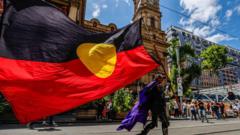
First Nations Issues: A Silence from the Top?
In recent months, a concerning trend has emerged within Australian politics: a perceived lack of substantial commentary and policy focus on First Nations issues from both the Prime Minister, Anthony Albanese, and the Leader of the Opposition, Peter Dutton. While various factors may contribute to this relative silence, its implications for reconciliation and the ongoing challenges faced by Indigenous communities are significant.
Analyzing the Absence of Dialogue
Several reasons could be behind the seemingly limited engagement on First Nations matters. The current political landscape is dominated by economic concerns, cost-of-living pressures, and international relations, potentially pushing Indigenous affairs down the list of immediate priorities. Furthermore, navigating the complexities of First Nations policy requires careful consultation and nuanced understanding, a process that can be time-consuming and politically sensitive.
However, critics argue that a lack of consistent and vocal leadership on these issues sends a detrimental message. It risks marginalizing the concerns of First Nations peoples and undermining efforts to address systemic inequalities. A proactive and visible commitment from the highest levels of government is crucial for fostering trust and driving meaningful change.
Specific Areas of Concern
The perceived silence is particularly noticeable in several key areas:
- Closing the Gap: While commitments to Closing the Gap remain, tangible progress in key indicators like health, education, and employment requires sustained focus and innovative solutions. More frequent updates and public accountability are needed.
- Treaty Negotiations: The push for treaty agreements with First Nations communities continues in various states and territories. A clear national framework and support for these local initiatives would provide greater certainty and momentum.
- Constitutional Recognition: The ongoing debate surrounding constitutional recognition for First Nations peoples demands careful consideration and open dialogue. A genuine commitment to meaningful consultation is essential.
- Justice Reform: Addressing the over-representation of Indigenous Australians in the justice system requires comprehensive reform, including culturally appropriate sentencing and diversion programs. Active leadership and support from both sides of parliament are vital.
The Potential Consequences of Inaction
The potential consequences of continued inaction or perceived indifference are far-reaching. A lack of political will can undermine the morale of Indigenous communities, erode trust in government institutions, and slow progress towards reconciliation. Furthermore, it risks perpetuating systemic inequalities and hindering the social and economic development of First Nations peoples.
Calls for Greater Engagement
Numerous voices within the community and political sphere are calling for greater engagement from both the Prime Minister and the Leader of the Opposition. This includes:
- Increased Public Statements: More frequent and substantive public statements on First Nations issues are needed to raise awareness and demonstrate a clear commitment.
- Meaningful Consultation: Genuine and ongoing consultation with Indigenous communities is essential for developing effective and culturally appropriate policies.
- Cross-Party Collaboration: Building consensus across party lines on key First Nations issues is crucial for ensuring long-term stability and progress.
- Resource Allocation: Adequate resources must be allocated to support First Nations initiatives and address systemic inequalities.
Looking Ahead
The path towards reconciliation requires sustained effort, open dialogue, and a genuine commitment from all levels of government. It is imperative that both the Prime Minister and the Leader of the Opposition prioritize First Nations issues and demonstrate the leadership necessary to drive meaningful change. The future of Australia depends on it.
```